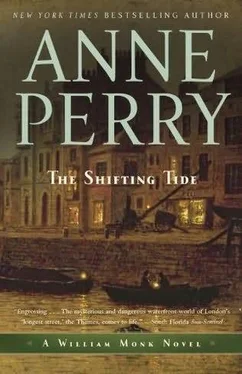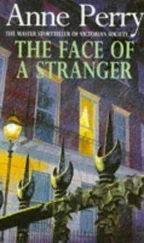Anne Perry - The Shifting Tide
Здесь есть возможность читать онлайн «Anne Perry - The Shifting Tide» весь текст электронной книги совершенно бесплатно (целиком полную версию без сокращений). В некоторых случаях можно слушать аудио, скачать через торрент в формате fb2 и присутствует краткое содержание. Жанр: Исторический детектив, на английском языке. Описание произведения, (предисловие) а так же отзывы посетителей доступны на портале библиотеки ЛибКат.
- Название:The Shifting Tide
- Автор:
- Жанр:
- Год:неизвестен
- ISBN:нет данных
- Рейтинг книги:5 / 5. Голосов: 1
-
Избранное:Добавить в избранное
- Отзывы:
-
Ваша оценка:
- 100
- 1
- 2
- 3
- 4
- 5
The Shifting Tide: краткое содержание, описание и аннотация
Предлагаем к чтению аннотацию, описание, краткое содержание или предисловие (зависит от того, что написал сам автор книги «The Shifting Tide»). Если вы не нашли необходимую информацию о книге — напишите в комментариях, мы постараемся отыскать её.
The Shifting Tide — читать онлайн бесплатно полную книгу (весь текст) целиком
Ниже представлен текст книги, разбитый по страницам. Система сохранения места последней прочитанной страницы, позволяет с удобством читать онлайн бесплатно книгу «The Shifting Tide», без необходимости каждый раз заново искать на чём Вы остановились. Поставьте закладку, и сможете в любой момент перейти на страницу, на которой закончили чтение.
Интервал:
Закладка:
Anne Perry
The Shifting Tide
ONE
“The murder doesn’t matter,” Louvain said abruptly, leaning a little over his desk towards Monk.
The two men were standing in the big office next to windows that faced the Pool of London with its forest of masts swaying on the tide against the ragged autumn sky. There were clippers and schooners from every seafaring nation on earth, barges from up and down the river, local pleasure boats, as well as tugs, ferries, and tenders.
“I have to have the ivory!” Louvain gritted the words between his teeth. “I’ve no time to wait for the police.”
Monk stared at him, trying to frame an answer. He needed this job, or he would not have come down to the Louvain Shipping Company offices prepared to undertake a task so far outside his usual area of skill. He was a brilliant detective in the city; he had proved it time and time again, both in the police force and later as a private agent of enquiry. He knew the mansions of the wealthy and the back streets of the poor. He knew the petty thieves and informers, the dealers in stolen goods and the brothel-keepers, the forgers and many of the general ruffians for hire. But the river, the “longest street in London,” with its shifting tides, its constant movement of ships, and men who spoke scores of different languages, was strange territory to him. The question beat in his mind, insistent as a pulse: Why had Clement Louvain sent for him rather than someone familiar with the docks and the water? The River Police themselves were older than Peel’s city police; in fact, they had existed for nearly three quarters of a century-since 1798. It was feasible that the River Police were too busy to give Louvain’s ivory the attention he wanted, but was that really his reason for calling in Monk?
“The murder is part of the theft,” Monk replied at last. “If we knew who killed Hodge, we’d know who took the ivory, and if we knew when, we might be a lot closer to finding it.”
Louvain’s face tightened. He was a wind-burned, slender-hipped man in his early forties, but hard-muscled like the sailors he hired to work his ships to the East African coast and back, with ivory, timber, spices, and skins. His light brown hair was thick and sprang up from his forehead. His features were broad and blunt.
“On the river at night, time makes no difference,” he said curtly. “There are light-horsemen, heavy-horsemen, night plunderers up and down all the time. Nobody’s going to inform on anyone else, least of all to the River Police. That’s why I need my own man, one with the skills I’m told you have.” His eyes swept over Monk, seeing a man reputed to have the same ruthlessness as himself, an inch or two taller, darker, with high cheekbones and a lean, powerful face. “I need that ivory back,” Louvain repeated. “It’s due for delivery, and the money is owed. Don’t look for the murderer to find the thief. That might work on shore. On the river you find the thief, and that will lead you to the murderer.”
Monk would have dearly liked to decline the case. It would have been easy enough; his lack of knowledge alone would have provided grounds for it. In fact, it was increasingly difficult to see why Louvain had sent for him rather than one of the many men who must at least know the river and the docks. There was always someone who would undertake a private commission-for a fee.
But Monk could not afford to point that out. He faced the bitter fact that he must make himself obliging to Louvain, and convince him, against the truth, that it was well within his power to find the ivory and return it to him in less time, and with greater discretion, than the River Police could or would do.
Necessity drove him, the spate of recent trivial cases which paid too little. He dared not go into debt, and since Hester had given her time to the clinic in Portpool Lane, which was wholly charitable, she added nothing to their financial situation. But a man should not expect his wife to keep herself. She asked little enough-no luxury, no vanity, only to be able to do the work she loved. Monk would have served any man to give her that. He resented Louvain because he had the power to cause him acute discomfort, but far more than that he was troubled that Louvain showed more concern about catching a thief who had robbed him of goods than a murderer who had taken Hodge’s life.
“And if we do catch him,” he said aloud, “and Hodge is buried, what evidence do we have? We will have concealed his crime for him.”
Louvain pursed his lips. “I can’t afford to have the theft known. It would ruin me. Would it serve if I swear a testimony as to exactly where I found the body, and how and when? The doctor can swear to his injuries, and you yourself can look, too. I’ll sign the document and you can have it.”
“How will you explain concealing the crime from the police?” Monk asked.
“I’ll hand them the murderer, with proof,” Louvain answered. “What more could they want?”
“And if I don’t catch him?”
Louvain looked at him with a wry, delicately twisted smile. “You will,” he said simply.
Monk could not afford to argue. Morally, it set ill with him, but in practical terms Louvain was right. He must succeed; but if he did not, then the River Police’s chances were even less.
“Tell me as much as you know,” he said.
Louvain sat down at last, easing himself into the padded round-backed chair and indicating that Monk should sit also. He fixed his gaze on Monk’s face.
“The Maude Idris put out from Zanzibar fully loaded with ebony, spices, and fourteen first-grade tusks of ivory, bound ’round the Cape of Good Hope and home. She’s a four-masted schooner with a nine-man crew: captain, mate, bosun, cook, cabin boy, and four able seamen, one per mast. That’s standard for her tonnage.” He was still watching Monk’s face. “She made fair weather most of the way, calling in for supplies and fresh water up the west coast of Africa. She reached Biscay five days ago, Spithead the day before yesterday, and tacked the last few miles upriver with the wind behind her. Dropped anchor just east of the Pool yesterday, October twentieth.”
Monk was listening intently, but the account held nothing useful to him. He was certain Louvain knew that; nevertheless they both continued to play out the charade.
“Crew was paid off,” Louvain went on. “As is usual. Been away a long time, close to half a year, one way and another. I left the bosun and three able seamen on board to keep things safe. One of them is the dead man, Hodge.” A flicker passed across his face. It could have been any emotion at all: anger, sorrow, even guilt.
“Four out of the nine stayed?” Monk confirmed it.
As if reading his thoughts, Louvain pursed his lips. “I know the river’s dangerous, especially for a ship newly come in. All the watermen will know the cargo’s still on it. Not much on the river is secret for long, but any fool could work that out. You don’t come up this far if you’re empty. You’re loading or unloading. I thought four men, armed, would be enough. I was wrong.” His face was filled with emotion, but which emotion was unreadable.
“How were they armed?” Monk asked.
“Pistols and cutlasses,” Louvain replied.
Monk frowned. “Those are close-quarter weapons. Is that all you carry?”
Louvain’s eyes widened almost imperceptibly. “There are four cannons on deck,” he replied guardedly. “But that’s in case of piracy at sea. You can’t fire that sort of thing on the river!” A slight flare of amusement crossed his face and vanished. “They only wanted the ivory, not the whole damn ship!”
“Was anyone else injured apart from Hodge?” Monk concealed his annoyance with an effort. It was not Louvain’s fault that he was obliged to work out of his depth.
Читать дальшеИнтервал:
Закладка:
Похожие книги на «The Shifting Tide»
Представляем Вашему вниманию похожие книги на «The Shifting Tide» списком для выбора. Мы отобрали схожую по названию и смыслу литературу в надежде предоставить читателям больше вариантов отыскать новые, интересные, ещё непрочитанные произведения.
Обсуждение, отзывы о книге «The Shifting Tide» и просто собственные мнения читателей. Оставьте ваши комментарии, напишите, что Вы думаете о произведении, его смысле или главных героях. Укажите что конкретно понравилось, а что нет, и почему Вы так считаете.












